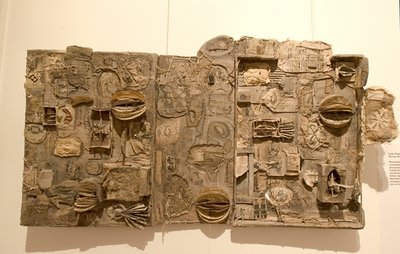Double Binds of Men

Jade Pegler - Round the Double Bind
After reading Kat Coble's posting today, it struck a nerve with me as she addressed the "this constant attempt to establish "worth".
I'm recalling a lot of my mental notes when I use to spend a lot of time during my five years at Promise Keepers speaking to men's groups, leaders of men and pastors about building effective strategies of men's ministries in the context of the local church. How does a man change in the context of a conformity environment and a transformational environment? One will sustain a man; the other will spiritually sink him.
Here are some of those notes:
In my response (with my experience with ministry to men), I have come to understand as a general tendency, most men derive their value from (1) what they do for a living (2) what they own (3) and who they know. I understand that men are looking for meaningful relationships - but placing friendships in these compartments are more easily managed. Trying to establish relationships can be difficult as we are not generally bent that way to be relational as women are.
Many men tend to place highest value on rules and principles. Women tend to place highest value on relationships. The challenge is cultivating meaniful relationships.
There are 3 Levels of Friendships:
1) Casual - The casual group represents your acquaintances.
2) Committed - The committed friend is one who cultivates your friendship.
3) Covenant - The covenant relationship represents those few people in your life who will always be there for you.
I recalled a book written by Rod Cooper: Double Bind: Escaping the Contradictory Demands of Manhood. Dr. Cooper was on staff at Promise Keepers in a Educational capacity, facilitating men's ministry currculum for the local church, notably two seminars: Building Men of Integrity and Foundations for Effective Men's Ministry.
Rather than spend the two hours rummaging through the boxes in my garage to locate my copy, I'm trying to find this apparently out of print book online - Amazon doesn't even carry it. Sigh.
Here's the editorial premise of the book:
"If you're like most men, cultural demands have turned you into an emotional chameleon. You're expected to be aggressive at work, yet nurturing at home; guarded in public, but sensitive in private.
Dr. Rodney Cooper calls such contradictory demands "double binds" - no-win situations men face every day, such as: A man's identity is reduced to the roles he plays rather than who he really is - but he can't adequately fulfill his roles without a firm sense of his true identity. The man who provides for his family hears complaints that his job keeps him from giving more of himself to his wife and children. The husband who spends all his spare time with his wife, as society expects, forfeits the benefits of friendships with other men. Men caught in double binds expend their energy trying to be everything to everyone. Consequently, they never dig deep into the heart of masculinity to discover for themselves their true identity and the freedom it brings.
Fortunately, there's a way to break free from the double binds in your life. Drawing on Dr. Cooper's experience as a professional counselor to men, Double Bind first explores the most prevalent double binds men face today - including the crucial Identity Double Bind - and points to a proven path for resolving each one. Then it reveals biblical principles for living the Abundant Life: a life characterized by peace and assurance, grounded in a clear understanding of who you are and Whose you are."
There are 14 binds that Dr. Cooper addresses - here are two:
The Breadwinner Bind
To be an acceptable husband and father the adult male is taught that he must provide his family with the best life possible. He will be admired and praised for being a good provider and a capable competitor. In the process of striving to make the "good life" a reality, he will be confronted by the complaints by his intimates that he is not involved enough with them, that he is always too busy or too tired. He will also accuse and question himself, as he succumbs to the compulsive, never-ending routines required for material survival, routines that make involvement with his family increasingly more difficult.
Either way he loses:
a. If he is a hard worker, he may be resented by his intimates for being a neglectful fmaily man and for having his values out of place.
b. On the other hand, if he withdraws from the rat race, he will compare himself and be compared by his family unfavorably with those who "make it."
The Health Bind
As a boy, the male is taught that it is non-masculine to complain about physical symptoms and illness. "Real men" do not give into their bodily ills and injuries unless the symptoms are severe. Being concerned with health and the body is considered weak, self-indulgent, or hypochondriac behavior. At the same time, he is bombarded about health and physical fitness.
Either way he loses:
a. If he is sensitive to body distress signals, takes good care of himself, goes to bed when fatigued or not feeling well, and refuses to work under those conditions his masculinity may be questioned.
b. On the other hand, if he ignores body signals, takes it "like a man", rises above his injuries, and pushes himself until he is forced to stop, he will be considered brave but he may thereby lay the foundations for chronic illness and early death.
More later...

1 comment:
This is really interesting stuff.
I wonder if men's challenge to find their worth in the "double-bind" is part of the reason that women have trouble finding their worth in the home as well.
Post a Comment